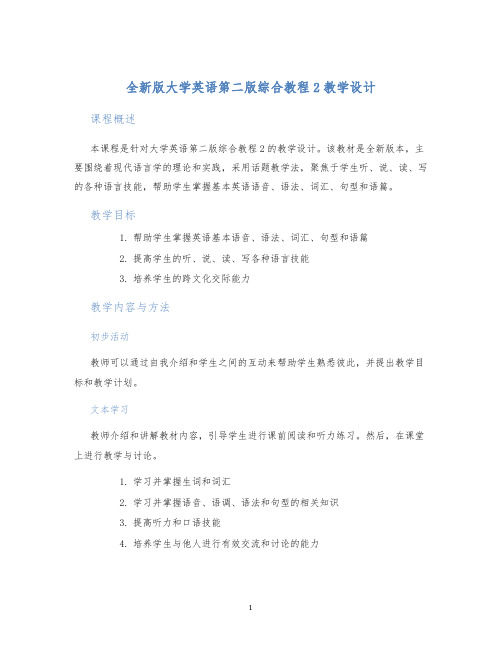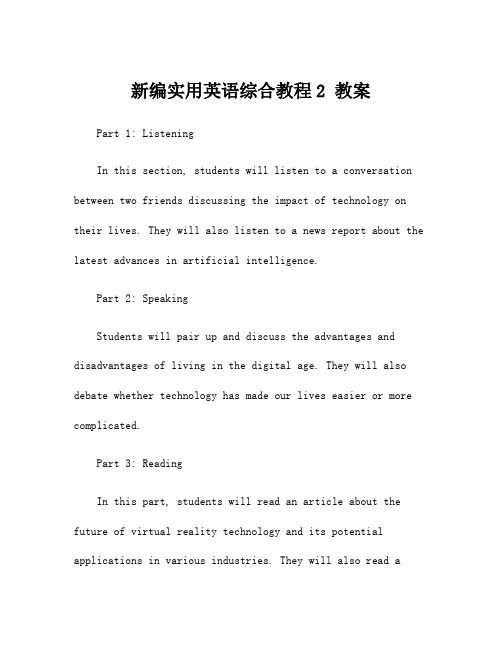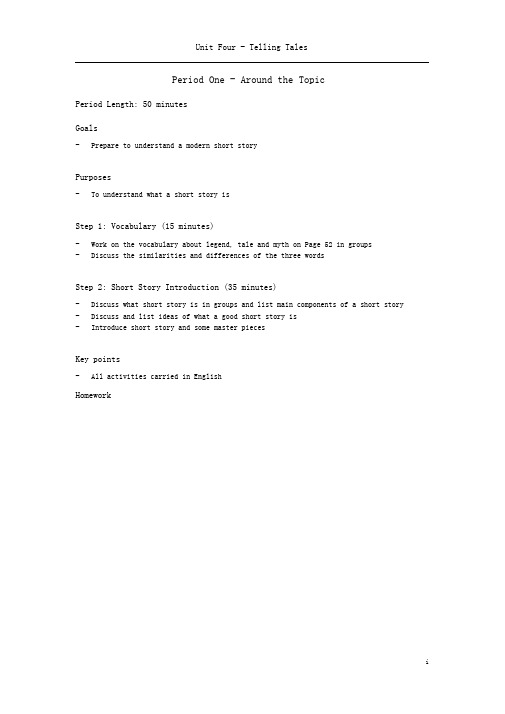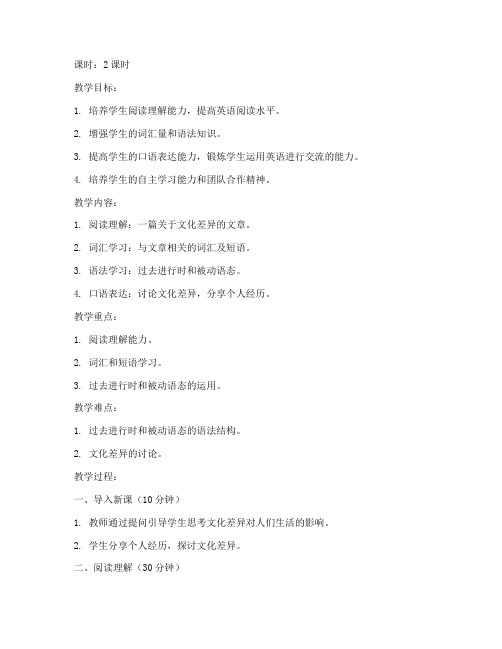教案 综合英语II教案
全新版大学英语第二版综合教程2教学设计

全新版大学英语第二版综合教程2教学设计课程概述本课程是针对大学英语第二版综合教程2的教学设计。
该教材是全新版本,主要围绕着现代语言学的理论和实践,采用话题教学法,聚焦于学生听、说、读、写的各种语言技能,帮助学生掌握基本英语语音、语法、词汇、句型和语篇。
教学目标1.帮助学生掌握英语基本语音、语法、词汇、句型和语篇2.提高学生的听、说、读、写各种语言技能3.培养学生的跨文化交际能力教学内容与方法初步活动教师可以通过自我介绍和学生之间的互动来帮助学生熟悉彼此,并提出教学目标和教学计划。
文本学习教师介绍和讲解教材内容,引导学生进行课前阅读和听力练习。
然后,在课堂上进行教学与讨论。
1.学习并掌握生词和词汇2.学习并掌握语音、语调、语法和句型的相关知识3.提高听力和口语技能4.培养学生与他人进行有效交流和讨论的能力在这个阶段,学生将与同伴进行对话和讨论来练习他们的交际技能和口语能力。
1.分组讨论和答案2.听力练习,然后对话3.角色扮演任务设置通过任务来提醒学生想关掌握的语言技能,并通过小组讨论来实现任务目标。
常见的任务包括:1.填空2.听力选择练习3.阅读理解评估与反馈在整个课程中,评估和反馈非常重要。
教师可以通过出题或其他方法来考察学生对知识的掌握程度,给予及时的反馈。
例如,教师可以组织小组活动,让学生之间互相评估,互相帮助,并在最后对学生的表现进行总结和评估。
教学策略任务型教学全新版大学英语第二版综合教程2采用话题教学法,并运用了任务型教学,强调学生的自主学习和学习者中心。
探究性学习教师引导学生进行自我学习和探究,帮助学生掌握更多的知识和技能。
教师可以根据学生的不同需求和能力,调整教学方法和进度,帮助学生实现个性化学习。
总结全新版大学英语第二版综合教程2的教学设计,旨在帮助学生掌握英语基本语音、语法、词汇、句型和语篇,提高听力、口语、阅读、写作技能,并培养学生的跨文化交际能力。
教学方法包括任务型教学、探究性学习和个性化学习,旨在激发学生的学习兴趣,提高学习效率。
新编实用英语综合教程2 教案

新编实用英语综合教程2 教案Part 1: ListeningIn this section, students will listen to a conversation between two friends discussing the impact of technology on their lives. They will also listen to a news report about the latest advances in artificial intelligence.Part 2: SpeakingStudents will pair up and discuss the advantages and disadvantages of living in the digital age. They will also debate whether technology has made our lives easier or more complicated.Part 3: ReadingIn this part, students will read an article about the future of virtual reality technology and its potential applications in various industries. They will also read ashort story about a robot that learns to think and feel like a human.Part 4: WritingStudents will practice writing a persuasive essay on the topic "Is technology making us smarter or lazier?" They will need to provide evidence and examples to support their argument.Unit 2 Social MediaPart 1: ListeningStudents will listen to a podcast about the impact of social media on mental health and relationships. They will also listen to a discussion about the pros and cons of using social media for activism.Part 2: SpeakingIn this section, students will participate in a group discussion on the topic "Should social media platforms beregulated?" They will need to express their opinions and listen to their classmates' viewpoints.Part 3: ReadingStudents will read an article about the rise ofinfluencer marketing on social media platforms. They will also read a blog post about the benefits of using social media for networking and career advancement.Part 4: WritingIn the writing task for this unit, students will create a social media campaign for a fictional company. They will need to come up with a creative strategy to promote the company's products or services on different social media platforms.Unit 3 Online SecurityPart 1: ListeningStudents will listen to a cybersecurity expert discussing common online security threats and how to protect againstthem. They will also listen to a news report about a recent data breach at a major company.Part 2: SpeakingIn this section, students will participate in role-plays where they act out different online security scenarios. They will need to practice giving advice on how to stay safe online and protect personal information.Part 3: ReadingStudents will read an article about the importance of using strong passwords and two-factor authentication to secure online accounts. They will also read a case study about a social engineering attack that led to a data breach.Part 4: WritingFor the writing task in this unit, students will compose an email to a friend explaining the importance of online security measures. They will need to provide tips andrecommendations for staying safe online and avoiding common scams and phishing attempts.。
致用英语综合教程综合英语2教案综合英语2教案unit4

Period One - Around the TopicPeriod Length: 50 minutesGoals-Prepare to understand a modern short storyPurposes-To understand what a short story isStep 1: Vocabulary (15 minutes)-Work on the vocabulary about legend, tale and myth on Page 52 in groups-Discuss the similarities and differences of the three wordsStep 2: Short Story Introduction (35 minutes)-Discuss what short story is in groups and list main components of a short story -Discuss and list ideas of what a good short story is-Introduce short story and some master piecesKey points-All activities carried in EnglishHomeworkPeriod Two — Reading (1): Mr. JonesPeriod Length: 50 minutesGoals-Vocabulary and grammar-Discourse knowledgePurposes-Learn new words and expressions-Understand key grammar points-Understand related discourse knowledgeStep 1: Pre-reading Tasks (15 minutes)-Discuss briefly the words and the task on Page 54 in groups-Check briefly the preview results from studentsStep 2: Reading activity (Part One: 25 minutes)-Listen to the reading-Ask students to present new words and sentences in groups-Ask students to give feedbacks for the information presented-Give more explanations to the new words and sentences-Provide extra knowledge about new words-Guide more on sentences and grammarStep 3: Summarization (10 minutes)-Summarize the words and sentences-Summarize the text learntKey points-Instructions and tasks carried in English, Chinese is used only when necessaryHomework-Review the learnt sections-Preview the following parts and exercisesPeriod Length: 50 minutesGoals-Vocabulary and grammar-Discourse knowledgePurposes-Learn new words and expressions-Understand key grammar points-Understand related discourse knowledgeStep 1: Pre-reading Tasks (15 minutes)-Discuss briefly the previously learnt part for understanding-Check briefly the preview results from studentsStep 2: Reading activity (Part Two: 25 minutes)-Listen to the reading-Ask students to present new words and sentences in groups-Ask students to give feedbacks for the information presented-Give more explanations to the new words and sentences-Provide extra knowledge about new words-Guide more on sentences and grammar-Check the comprehension questions on Page 56Step 3: Summarization (10 minutes)-Summarize the words and sentences-Summarize the text learntKey points-Instructions and tasks carried in English, Chinese is used only when necessaryHomeworkReview the learnt sectionsPreview the following parts and exercisesPeriod Length: 50 minutesGoals-Enhance the vocabulary abilityPurposes-Learn detailed usage of certain words-Learn detailed usage of certain language structuresStep 1: Exercise A (15 minutes)-Work Vocabulary and Structure exercise A on Page 56 in groups -Check and compare answers in groups and negotiate them-Ask students to present their answers-Provide feedbacks for answersStep 2: Exercise B (15 minutes)-Work exercise B on Page 57 in groups-Check and compare answers in groups and negotiate them-Ask students to present their answers-Provide feedbacks for answersStep 3: Exercise C (20 minutes)-Work exercise C & D on Page 57 in groups-Check and compare answers in groups and negotiate them-Ask students to present their answers-Provide feedbacks for answersKey points-Instructions and activities be carried in EnglishHomework-Finish Writing Task on Page 58 and turn them in due next period -Prepare for the grammar and vocabulary exercisesPeriod Five Language in UsePeriod Length: 50 minutesGoals-Grammar knowledge and vocabulary buildingPurposes-Narrative Tenses-Phrasal Verbs with off and outStep 1: Narrative Tenses (30 minutes)-Test grammar knowledge on Page 59 for checking grammar abilities-Work on exercises A, B & C on Pages 59 & 60 in groups-Ask students to present their answers and provide necessary explanations -Give supplementary information on those structures if necessaryStep 2: Phrasal Verbs with off and out (20 minutes)-Work on exercises A & B on Pages 28 in groups-Ask students to present their answers and explain Compound words-Give supplementary information on Compound words if necessaryKey points-Give instructions in English-Explain grammar knowledge in ChineseHomeworkPeriod Six — Extension: The Enchanted Knife Period Length: 50 minutesGoals-Extend reading abilitiesPurposes-Apply previously learnt vocabulary and cultural knowledge in reading-Develop reading abilities-Improve abilities on negotiation and discussionStep 1: Reading (20 minutes)-Ask students to readThe Enchanted Knifeon Page 30 in groups-Understand new words and sentences within the group by negotiating in English -Finish Vocabulary Check on Page 64Step 2: Discussion (30 minutes)-Discuss questions listed on Page 64-Ask each group to present their opinions for the questions in front-Give feedbacks and remarks for presentationsKey points-Inspect group discussions and give guidance to promote discussionsHomework-Review previously learnt materials-Prepare for the ProjectPeriod Seven - Project (1): A Story of Your Own Period Length: 50 minutesGoals-Teamwork abilitiesPurposes-Apply previously learnt words and cultural knowledge into actual use-Develop teamwork abilitiesStep 1: A Make-up story (25 minutes)-Make up a strange story following the example of Mr. Jones with clue words and instructions on Page 62Step 2: An odd experience (25 minutes)-Work in groups to finish the story of An odd experience on Page 62-Ask each group to present their stories and provide remarksKey points-All preparations and negotiations be carried in English-Give guidance while students prepare the projectHomeworkPeriod Eight - Project (2): A Story of Your OwnPeriod Length: 50 minutesGoals-See abovePurposes-See aboveStep 1: Prepare for a surprise (25 minutes)-Share your stories with others and present them with pictures if possibleStep 2: Evaluate stories (25 minutes)-Give remarks to the presentations after the whole class have finished presenting stories-Group members should also talk about what they have learnt from this presentation project.Key points-Give instructions for presentationHomework-Revise writings according to the feedbacks and remarks received-Turn the revised copies before next periodPeriod Nine - Culture Tips: AthenaPeriod Length: 50 minutesGoals-Understand part of western culture from another perspectivePurposes-Help students to understand western culture-Help students to learn more cultural expressionsStep 1: Warm-up (15 minutes)-Read materials onAthena on Page 65-Help on any new words if necessaryStep 2: Open Discussion (35 minutes)-Ask students to talk more about western myths and tales if possible-Encourage students to pay more attention to the western culture while learning a languageKey points-All activities be carried in EnglishHomeworkPeriod Ten - Learning to Learn Period Length: 50 minutesGoalsPurposesStep 1Step 2Key pointsHomework。
大学英语综合教程book2教案

一、教学目标1. 知识目标:(1)掌握本单元的核心词汇和短语;(2)了解本单元的文化背景知识;(3)熟悉本单元的语法结构。
2. 能力目标:(1)提高阅读理解能力,学会从文章中获取信息;(2)培养写作能力,学会运用所学词汇和语法进行写作;(3)提高听说能力,学会在日常生活和工作中运用所学知识。
3. 情感目标:(1)激发学生对英语学习的兴趣,培养良好的学习习惯;(2)培养学生关注社会、关心他人的情感;(3)培养学生具备一定的国际视野。
二、教学内容1. 课文内容:Unit 1 A. Text 1(课文)2. 课文背景:介绍课文中所涉及的文化背景知识。
三、教学重点与难点1. 教学重点:(1)课文中的核心词汇和短语;(2)课文中的语法结构;(3)课文中的阅读理解技巧。
2. 教学难点:(1)课文中的长难句分析;(2)课文中的文化背景知识;(3)课文中的写作技巧。
四、教学方法1. 案例分析法:通过分析课文中的案例,引导学生理解课文内容;2. 互动式教学:鼓励学生积极参与课堂讨论,提高学生的参与度;3. 任务型教学:设计不同的任务,让学生在完成任务的过程中提高英语能力;4. 多媒体辅助教学:利用多媒体资源,丰富课堂内容,提高教学效果。
五、教学过程1. 导入新课(5分钟)(1)介绍课文背景;(2)提出本节课的学习目标。
2. 课文讲解(20分钟)(1)讲解课文中的核心词汇和短语;(2)分析课文中的语法结构;(3)分析课文中的长难句;(4)引导学生理解课文内容。
3. 阅读理解练习(10分钟)(1)布置阅读理解练习题;(2)学生独立完成练习;(3)教师讲解答案,总结阅读技巧。
4. 课堂讨论(10分钟)(1)提出与课文相关的问题;(2)学生分组讨论,分享观点;(3)教师总结讨论结果。
5. 写作练习(10分钟)(1)布置写作任务;(2)学生独立完成写作;(3)教师讲解写作技巧。
6. 课堂小结(5分钟)(1)回顾本节课所学内容;(2)布置课后作业。
大学英语综合教程2unit2电子教案

一、教学课题Unit 2: Great Inventions二、教学目的1. 培养学生阅读理解能力,提高对科技发明类文章的阅读兴趣。
2. 扩大学生词汇量,掌握与科技发明相关的常用词汇和短语。
3. 提高学生的听说能力,通过角色扮演等活动,使学生能够运用所学知识进行交流。
4. 培养学生的写作能力,通过写作练习,使学生能够运用所学语法和词汇表达自己的观点。
三、课时分配1. 阅读理解:2课时2. 听力训练:1课时3. 口语表达:1课时4. 写作练习:1课时四、教学重点1. 理解文章大意,掌握文章结构。
2. 掌握与科技发明相关的词汇和短语。
3. 学会运用所学知识进行口语和书面表达。
五、教学难点1. 理解文章中的复杂句型。
2. 准确运用所学词汇和短语进行口语和书面表达。
六、教学过程第一课时:阅读理解1. 导入新课:通过展示一些科技发明图片,激发学生的兴趣,引入本节课的主题。
2. 阅读课文:学生自主阅读课文,了解文章大意,掌握文章结构。
3. 翻译练习:学生翻译文章中的重点句子,巩固词汇和语法知识。
4. 课堂讨论:针对文章中的关键问题进行讨论,加深对文章内容的理解。
第二课时:听力训练1. 导入新课:通过播放一段与科技发明相关的英语听力材料,激发学生的兴趣。
2. 听力练习:学生听录音,回答问题,提高听力理解能力。
3. 课堂讨论:针对听力材料中的关键问题进行讨论,加深对内容的理解。
第三课时:口语表达1. 导入新课:通过展示一些科技发明图片,激发学生的兴趣,引入本节课的主题。
2. 角色扮演:学生分组进行角色扮演,模拟科技发明场景,运用所学知识进行交流。
3. 课堂讨论:针对角色扮演中的问题进行讨论,提高口语表达能力。
第四课时:写作练习1. 导入新课:通过展示一些科技发明案例,激发学生的写作兴趣。
2. 写作指导:教师讲解写作技巧,指导学生如何运用所学知识进行写作。
3. 写作练习:学生根据所学知识,撰写一篇关于科技发明的短文。
全新版综合英语教程第二册教案

Unit5 Overcoming ObstaclesBy 冯蜀蓉Objectives:1.grasp the main idea (dreaming and hard work helped Michael Stone on his waysuccess) and structure of the text( narration with a flashback).2.appreciate the narrative skills demonstrated in the text (using detail to bring out acharacter; a surprising ending; use of puns),3.master the key language points and grammatical structures in the text;4.conduct a series of reading, listening, speaking and writing activities centeredupon the theme of the unit.Focuses:1.Grasp the main idea;2.Appreciate the writing skill3.Master the key language points and grammatical structures in the text.Outline:Period 1 : pre-reading task and while-reading task (part I and II)Period 2: while-reading task (part II)Period 3 while-readingPeriod 4 post –readingPeriod 1Step 1 ( 10 mins)T asks Ss to listen to the song Coming out of dark and answer the following questions:---Consider the title of the song, what does “dark” refer to? ( near death;loss of consciousness)---How is the song related to the theme of the unit? ( To get over despair after injury is also a form of overcoming obstacles)step 2 ( 15 mins)T asks Ss to translate the following proverbs:---where there is a will, there is a way.---Rome is not built in a day.---God helps those who help themselves.---You shall reap what you sow.---Constant dripping wears away the stone.Then T asks Ss to scan Text A to find a similar saying by Michael’s father , which is in italics: If you want something , work for it./ You want something, work for it!Step 3 (3 mins)T leads to the text by saying : Hard work is important to success, but it is not the only factor that contributes to success. As we will find out in this text, dreaming is equally important.Step 4 (17 mins)T guides Ss through the directions for Text organization Exercise 1, so that they knowthe text consists of four parts.Ss scan the first sentence of Paras. 1—6, and get ready to answer the following questions:---Which first sentence switches from past tense to past perfect tense?The first sentence of Para.3---Which first sentence shows that the flashback is over and the narration returns to the National Junior Olympics?The first sentence of Para.6----By now, do you know how to divide the text into four parts?Ss then do Text Organization Exercise 2Period 2Step 1 (45 mins)T explains language points and gives Ss practice.Period 3Step 1 (15mins)Ss sum up the mains ideas of each part .Step 2 (15 mins)Ss answer these questions---Without the last sentence, would you still admire Michael Stone’s achievement?---Who would you admire better, a Michael Stone with a sound body or a blind Michael Stone?---Why does the author keep the secret about Michael’s blindness un til the last sentence?Step 3 (15mins)Ss scan the text again to find out the three instances where “work” is used as a verb.T asks some Ss to explain in English the three different meaning of “work”.Ss do the after-text usage exercise on “ work”.Period 4Step 1Finding out details: ( 25 mins)1)T introduces the activity by saying: a child usually inherits characteristics form both his /her mother and father. So does Michael Stone. Michael’s mother is romantic and passionate, while his father is a hard-core realist. Work with a partner, find out those details about Michael Stone that shows him to be his mother’s boy or his father’s son.2) Some pairs report to the class their findings.3) T asks Ss this question: Dreaming and hard work, which is more important to Michael’s success? Why?Step 2 (15 mins)Playing on the meaning of words.1)T introduces the idea that many words have more than one meaning and canremind one of a number of different ideas and events all at once.2)Ss read the first three sentences of the text to find out where the author uses aword in two different senses.3)Ss give individual opinion on this question: How do you understand the titleof this text? Does it also carry more than one meaning?Step 3 ( 5 mins)Review the text.Period 5T checks on Ss’ exercises/Language points:1. bear out: prove that is truee.g. The evidence that the US Central Intelligence Agency has obtained bears out their claims that Bin Laden is closely related to the September 11 terrorists attacks in the USA.The witnesses will bear you out in court.2. mere: nothing more thane.g. It’s a mere 200 meters from my house to the collegeHow can you expect her to work out such a complicated math problem?. She is a mere child.3.passion: strong feeling. esp. of lovee.g. He loved her still, with the same passion as he always had.She had never before loved anyone with such passion.4.detail:go into details: explain sth. thoroughlye.g. can you give me a rough idea of what happened, without going into detail?in detail : fully or thoroughlye.g. She told them in detail what they were going to say at the meeting?5.recur: come or happen againe,g, The theme of love recurred in many of his books.The school authorities warned the student that he will be expelled if this cheating recurs.6.coincide: 1) happen at the same timee.g. His arrival in Tokyo coincided with the beginning of the war.2) be in agreemente.g. He gave great encouragement to his students, especially if their passions happened to coincide with his own.7.on one/two/several occasions: once /twice/several times in the passte.g. On several occasions, I attempted to talk with my parents about my taking a part time fob, but my mother instantly interrupted me by asking me questions about my studies.He drinks far too much. On occasion I saw him drink a whole bottle of vodka. 8.vain: too pleased with one’s own abilities or lookse,g, Too much praise can make a person vain.She was vain of her appearance.9.be ashamed of : feeling foolish or uncomfortable because ofe.g. She was so ashamed of cheating in the test that she went and told the teacher.You should be ashamed of yourself, telling lies at your age.10.along with: together withe.g. Along with hundreds of others he had invested money in stocks and bonds.I keep my checks in the top drawer, along with my other important documents.11.bring back to earth: cause … to stop day-dreaming; cause … to return to realitye.g. Emily’s voice brought him back to earth.Jack had been spending all his time chatting on line woth his key-pals until his parents had a word with him and brought him back to earth,12.media: means of mass communicatione.g. They are wondering whether bias in the news media contributed to the candidate’s defeat.Much of what children learn comes directly from the mass media.。
大学英语2综合教程教案

课时:2课时教学目标:1. 培养学生阅读理解能力,提高英语阅读水平。
2. 增强学生的词汇量和语法知识。
3. 提高学生的口语表达能力,锻炼学生运用英语进行交流的能力。
4. 培养学生的自主学习能力和团队合作精神。
教学内容:1. 阅读理解:一篇关于文化差异的文章。
2. 词汇学习:与文章相关的词汇及短语。
3. 语法学习:过去进行时和被动语态。
4. 口语表达:讨论文化差异,分享个人经历。
教学重点:1. 阅读理解能力。
2. 词汇和短语学习。
3. 过去进行时和被动语态的运用。
教学难点:1. 过去进行时和被动语态的语法结构。
2. 文化差异的讨论。
教学过程:一、导入新课(10分钟)1. 教师通过提问引导学生思考文化差异对人们生活的影响。
2. 学生分享个人经历,探讨文化差异。
二、阅读理解(30分钟)1. 学生阅读文章,了解文化差异的相关知识。
2. 教师讲解文章中的生词和短语,帮助学生理解文章内容。
3. 学生回答教师提出的问题,检验阅读理解效果。
三、词汇学习(15分钟)1. 教师讲解与文章相关的词汇和短语,如:culture, difference, adapt, etc.2. 学生跟读并拼写词汇,巩固记忆。
四、语法学习(15分钟)1. 教师讲解过去进行时和被动语态的语法结构,结合例句进行讲解。
2. 学生进行相关练习,巩固语法知识。
五、口语表达(30分钟)1. 学生分组讨论文化差异,分享个人经历。
2. 学生代表发言,展示讨论成果。
3. 教师点评学生的口语表达,提出改进建议。
六、课堂小结(5分钟)1. 教师总结本节课的学习内容,强调重点和难点。
2. 学生反思自己的学习情况,提出疑问。
七、布置作业(5分钟)1. 阅读教材中的相关文章,完成课后练习。
2. 复习本节课学习的词汇和语法知识。
教学评价:1. 课堂参与度:观察学生在课堂上的发言情况,评价其口语表达能力。
2. 阅读理解能力:通过课后练习和课堂提问,检验学生的阅读理解效果。
新编实用英语综合教程2unit-1-教案

dance in oral English.students will fine tune their listening and comprehensionskills through exercises relating to inviting people out.with invitations, when one wants to accept or does not accept.and a reply to the invitation one gets.Patterns and expressions for talking about invitations:I’dliketoinviteyoutodinner.我想请你吃晚饭。
Why don’t you come and join us for disco?你为什么不和我们一起跳迪斯科?It’s very kind of you to invite me.谢谢你邀请我。
How nice of you! Many thanks.你真好!多谢。
I’dlove to. That wouldbe grea t.我很愿意去。
太好了!Oh, dear, I’m afraid I’m busy tonight. Perhaps tomorrow evening?哦,亲爱的,今晚我很忙。
明晚也许可以吧?Could you make it another time, perhaps next Sunday?你能改个时间吗,下个星期天怎样?It’s very kind of you, but you see I’ll have to prepare for my exam.非常感谢,可你知道我得准备考试。
I’m sorry I can’t, but thank you all the same.真抱歉,我不能去。
可还是要谢谢你。
Wouldyoulike to … ?您愿意…吗?I’dlike toinvite youto …我想邀请你参加…?I would like to know if you could come to …?我想知道你是否能来…May I invite you to …?敬请光临…Wouldit be possible tojoinus for… ?请问你是否能光临…?Would it be convenient to take part in …?请问你是否方便参加…?I was wondering if you would be interested in …?不知你是否有兴趣参加…?Thank you. I’ll be happy to come.谢谢.我很高兴接受你的邀请.I’dlove to. That wouldbe grea t.我很愿意去.太好了.Thank you for invitation.谢谢你的邀请.I’dbe gladtocom e.我很高兴前往.I’d love to, but I can’t come.我很想参加,但是不能来.Thank you for your invitation, but I don’t think I can make it.感谢你的邀请,但我恐怕不能赴约.Unfortunately,I’malready busy that day.很遗憾,我那天事情太多了.It’s very kind of you, but you see I’ll have to prepare for my exam.非常感谢,可你知道我得准备考试。
- 1、下载文档前请自行甄别文档内容的完整性,平台不提供额外的编辑、内容补充、找答案等附加服务。
- 2、"仅部分预览"的文档,不可在线预览部分如存在完整性等问题,可反馈申请退款(可完整预览的文档不适用该条件!)。
- 3、如文档侵犯您的权益,请联系客服反馈,我们会尽快为您处理(人工客服工作时间:9:00-18:30)。
教案课程名称:综合英语II年月日课题Unit 1 Understanding Chinese Culture-Part One教学目的In this unit, the students will learn:The origin and traditions of the Chinese New YearHow to use present participles as adverbialsHow to introduce Chinese New Year traditions to foreign friends教学重点、难点The important points:The words and expressions of this unitUsing present participles as adverbialsThe difficult points:The traditions of Chinese and western traditions of some festivalsLearn to introduce Chinese New Year traditions to foreign friends教学方法Lecturing method教学设备与器材Multi-media equipment课时量2 periods教案续页第页年月日课题Unit 1 Understanding Chinese Culture-Part Two教学目的In this unit, the students will learn:The origin and traditions of the Chinese New YearHow to use present participles as adverbialsHow to introduce Chinese New Year traditions to foreign friends教学重点、难点The important points:The words and expressions of this unitUsing present participles as adverbialsThe difficult points:The traditions of Chinese and western traditions of some festivalsLearn to introduce Chinese New Year traditions to foreign friends教学方法Lecturing method教学设备与器材Multi-media equipment课时量2 periods教案续页第页年月日课题Unit 2 Feel Free to Inquire-Part One教学目的In this unit, the students will learn:The importance of being inquisitiveHow to be an inquisitive personHow to use the structures of so that and so…thatThree types of compound words教学重点、难点The important points:The words and expressions of this unitUsing three types of compound wordsThe difficult points:The discussion of the importance of being inquisitiveLearn to use the structures of so that and so…that教学方法Lecturing methodGroup activity教学设备与器材Multi-media equipment课时量4 periods教案续页第页教案续页第页年月日课题Unit 2 Feel Free to Inquire-Part Two教学目的In this unit, the students will learn:The importance of being inquisitiveHow to be an inquisitive personHow to use the structures of so that and so…thatThree types of compound words教学重点、难点The important points:The words and expressions of this unitUsing three types of compound wordsThe difficult points:The discussion of the importance of being inquisitiveLearn to use the structures of so that and so…that教学方法Lecturing methodGroup activity教学设备与器材Multi-media equipment课时量4 periods教案续页第页年月日课题Unit 3 Manage Your Time-Part One教学目的In this unit, the students will learn:Manage your time efficientlyUnderstand the 80/20 principleHow to use will correctly教学重点、难点The important points:The words and expressions of this unitUsing the modal word will correctlyThe difficult points:The discussion of the importance of being in timeLearn to use the time management principle教学方法Group activityLecturing method教学设备与器材Multi-media equipment课时量4 periods教案续页第页教案续页第页教案续页第页年月日课题Unit 3 Manage Your Time-Part Two教学目的In this unit, the students will learn:Manage your time efficientlyUnderstand the 80/20 principleHow to use will correctly教学重点、难点The important points:The words and expressions of this unitUsing the modal word will correctlyThe difficult points:The discussion of the importance of being in timeLearn to use the time management principle教学方法Group activityLecturing method教学设备与器材Multi-media equipment课时量4 periods教案续页第页教案续页第页年月日课题Unit 4 Telling Tales教学目的In this unit, the students will learn:Read different types of storiesDescribe appearance by using appropriate adjectivesExpress interest and surpriseUse narrative tenses教学重点、难点The important points:The words and expressions of this unitRead different types of storiesThe difficult points:Use narrative tensesLearn to express interest and surprise教学方法Lecturing method教学设备与器材Multi-media equipment课时量6 periods教案续页第页教案续页第页年月日课题Unit 5 Relationships-Part One教学目的In this unit, the students will learn:Show appreciation to those who are closeMaintain a close relationship with othersUse a relative pronoun what and whichTalk about relationships among various people教学重点、难点The important points:The words and expressions of this unitUse a relative pronoun what and whichThe difficult points:Talk about relationships among various peopleShow appreciation to those who are close教学方法Lecturing methodGroup activity教学设备与器材Multi-media equipment课时量4 periods教案续页第页年月日课题Unit 5 Relationships-Part Two教学目的In this unit, the students will learn:Show appreciation to those who are closeMaintain a close relationship with othersUse a relative pronoun what and whichTalk about relationships among various people教学重点、难点The important points:The words and expressions of this unitUse a relative pronoun what and whichThe difficult points:Talk about relationships among various peopleShow appreciation to those who are close教学方法Lecturing methodGroup activity教学设备与器材Multi-media equipment课时量4 periods教案续页第页课题Unit 6 Crime and Security-Part One教学目的In this unit, the students will learn:Talk about crime and security issuesCarry out an investigation on neighborhood security Use modal verbs to express possibility and probability教学重点、难点The important points:The words and expressions of this unitCarry out an investigation on neighborhood securityThe difficult points:Talk about crime and security issuesUse modal verbs to express possibility and probability教学方法Lecturing methodGroup activity教学设备与器材Multi-media equipment课时量4 periods教案续页第页年月日课题Unit 6 Crime and Security-Part Two教学目的In this unit, the students will learn:Talk about crime and security issuesCarry out an investigation on neighborhood securityUse modal verbs to express possibility and probability教学重点、难点The important points:The words and expressions of this unitCarry out an investigation on neighborhood securityThe difficult points:Talk about crime and security issuesUse modal verbs to express possibility and probability教学方法Lecturing methodGroup activity教学设备与器材Multi-media equipment课时量4 periods教案续页第页年月日课题Unit 7 Men and Women-Part One教学目的In this unit, the students will learn to:Talk about differences between men and women;Describe a person’s personality;Use expressions to emphasize emotions.教学重点、难点The important points:The words and expressions of this unitCarry out an investigation on gender differencesThe difficult points:Talk about men and women issuesUse different words to express emotions and personalities.教学方法Lecturing methodGroup discussion教学设备与器材Multi-media equipment课时量4 periods教案续页第页。
